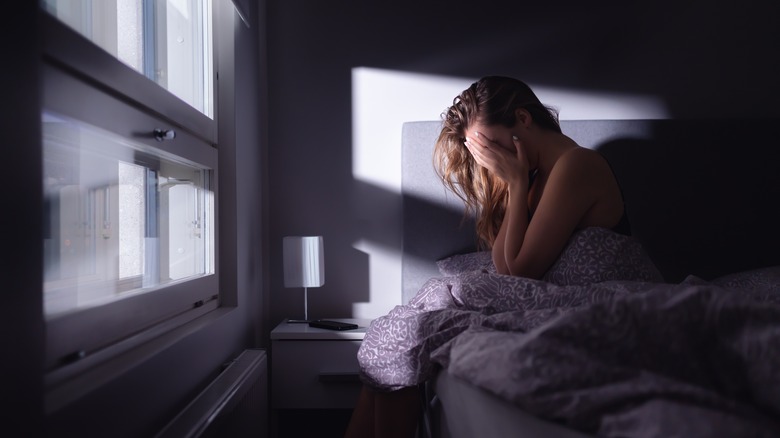Does Sleeping In The Cold Trigger Nightmares?
We go to sleep to get rest. We want to wake up refreshed to tackle the next day. The last thing we want is nightmares. From walking off cliffs to being chased by zombies, your nightmares can take on very personal and terrifying turns.
You can try skipping the horror movies before heading to bed and even having a night lamp on to quell your fear of dark shapes forming in your room, but when a bad dream decides to come, it generally does. Did you know that the temperature of your room could be causing your nightmares too?
According to the director of the Sleep Disorders Center at the Scripps Clinic and Research Foundation in La Jolla, dreams can take on a nightmarish turn if you feel cold while sleeping (via The Los Angeles Times). Picture a blanket slipping off of you at night or an open window that's blasting in cold air. It's probably similar to the logic of why you dream of desperately looking for a bathroom when your bladder is full as you sleep. Your bodily sensations could be playing a role when you have a nightmare, per sleep experts. This is not the only reason.
Cold weather-induced sadness can also be to blame
Winter season usually accompanies seasonal affective disorder (SAD) in some people. The leaves have no life in them, and there's snow all around, which might be preventing you from stepping out or socializing. The colder months of the year can breed isolation and a sense of hopelessness, which can all contribute to depressive feelings.
Per Dr. Jalpa Bhuta of Global Hospital, Mumbai, one of the symptoms of SAD is insomnia, and sleep disruptions of this nature can trigger nightmares too (via Hindustan Times).
"According to studies, it is found that nightmares are [a] common problem among people with symptoms of depression. It also frequently co-occurs with insomnia and, as such, these problems form a strongly interconnected symptomatic triad," explained the psychiatrist. A 2016 study published in the Journal of Sleep Research found that there was a link between SAD, insomnia, and nightmares. What's the ideal temperature to avoid nightmares, then?
Pay attention to these tips if you want a good night's rest (hopefully, minus nightmares)
While there's no real way to avoid nightmares altogether, paying attention to the temperature in your room can go a long way. You don't want it too hot, especially since sleeping in a cold room is better for your health. According to the former chairman of the British Sleep Society, Dr. Neil Stanley, "In order for us to get a good night's sleep, we need to lose around 1 degree C [33.8 degrees F] of our internal body temperature, which sits at around 37 degrees C [98.6 degrees F]" (via Metro).
The Sleep Foundation recommends setting the temperature anywhere between 60 and 68 degrees F if you want optimal sleep. You could also follow a set sleep schedule, avoid alcohol and caffeine before bedtime, switch off from ingesting disturbing news or media at night, and prioritize your mental health by journaling, practicing deep breathing exercises, or meditating before sleep. Ultimately, quality sleep is one of your best defenses against nightmares.
While in most cases, nightmares are nothing to be worried about, in some instances, they could be a sign of something else that's going on with you. Manhattan-based sleep and health psychologist, Joshua Tal, told CNN Health, "Nightmares might be a sign of a larger issue, such as PTSD or a mood disorder. It is possible to treat the nightmares without treating the underlying disorder, but it may also be helpful to treat both the symptom and the disorder."



